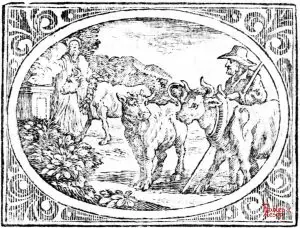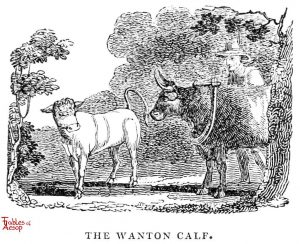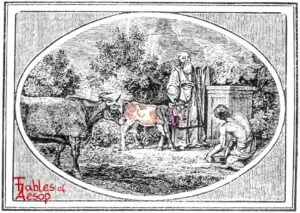A heifer (or calf) watched an ox pulling a plow and chided him for his hard life versus the others easy life. The ox got the last word. See why here.
Be careful how you make fun of anyone.
A Heifer watched an Ox working a plow and made fun of his working while she lived a life of leisure. When festival time arrived, however, the Ox was released from his yoke and watched as the Heifer was bound and led away to be slain for the festival. The Ox smiled as he went back to work the next day.

Townsend version
A Heifer saw an Ox hard at work harnessed to a plow, and tormented him with reflections on his unhappy fate in being compelled to labor. Shortly afterwards, at the harvest festival, the owner released the Ox from his yoke, but bound the Heifer with cords and led him away to the altar to be slain in honor of the occasion. The Ox saw what was being done, and said with a smile to the Heifer: “For this you were allowed to live in idleness, because you were presently to be sacrificed.”

Samuel Croxall (The Wanton Calf)
A CALF, full of play and wantonness, seeing the Ox at plough, could not forbear insulting him. What a sorry, poor drudge art thou, says he, to bear that heavy yoke upon your neck, and go all day drawing a plough at your tail, to turn up the ground for your master! But you are a wretched dull slave, and know no better, or else you would not do it. See what a happy life I lead; I go just where I please; sometimes I lie down under a cool shade; sometimes frisk about in the open sunshine; and, when I please, slake my thirst in the clear sweet brook; but you, if you were to perish, have not so much as a little dirty water to refresh you. The Ox, not at all moved with what was said, went quietly and calmly on with his work; and, in the evening, was unyoked and turned loose. Soon after which he saw the Calf taken out of the field, and delivered into the hands of a priest, who immediately led him to the altar, and prepared to sacrifice him. His head was hung round with fillets of flowers, and the fatal knife was just going to be applied to his throat, when the Ox drew near and whispered him to this purpose: Behold the end of your insolence and arrogance; it was for this only you were suffered to live at all; and pray, now, friend, whose condition is best, yours or mine?
THE APPLICATION
To insult people in distress, is the property of a cruel, indiscreet, and giddy temper; for as the proceedings of fortune are very irregular and uncertain, we may, the next turn of the wheel, be thrown down to their condition, and they exalted to ours. We are likewise given to understand by this fable, what the consequence of an idle life generally is, and how well satisfied laborious, diligent men are, in the end, when they come quietly to enjoy the fruits of their industry. They who by little tricks and sharpings, or by open violence and robbery, live in a high expensive way, often, in thier hearts at least, despise the poor honest man, who is contented with the virtuous product of his daily labour, and patiently submits to his destiny. But how often is the poor man comforted, by seeing these wanton villians led in triumph to the altar of justice, while he has many a cheerful summer’s morning to enjoy abroad, and many a long winter’s evening to indulge himself in at home, by a quiet hearth, and under an unenvied roof; blessings, which often attend a sober industrious man, tho’ the idle and the profligate are utter strangers to them. Luxury and intemperance, besides their being certain to shorten a man’s days, are very apt not only to engage people with their seeming charms into a debauched life, utterly prejudicial to their health, but to make them have a contempt for others, whose good sense and true taste of happiness inspire them with an aversion to idleness and effem nacy, [sic] and put them upon hardening their constitution by innocent excercise and laudable employment. How many do gluttony and sloth tumble into an untimely grave; while the temperate and the active drink sober draughts of life, and spin out their thread to the most desirable length.

Thomas Bewick (The Wanton Calf)
A Calf, which had been some time fattening in a rich pasture, full of wantonness and arrogance, could not forbear insulting an old Ox every time he saw him at the plough. What a sorry drudge art thou, says he, to bear that heavy yoke, and draw all day a plough at thy tail! See, what a fat, sleek, and comely appearance I make, and what a life of ease I lead: I go where I please, and frisk about in the sunshine, or lie down under the cool shade, just as my own fancy prompts me. The Ox, not moved by this insolence, made no reply, but pursued his daily round of alternate labour and rest, until he saw the Calf taken and delivered to a priest, who immediately led him to the altar, and prepared to sacrifice him. When the fatal knife was just at his throat, the Ox drew near, and whispered him to this purpose: see what your wanton and lazy life has brought you to, a premature and painful death.
APPLICATION.
We may learn by this Fable the general consequence of an idle life, and how well rewarded laborious diligent men are in the end, when they quietly enjoy the fruits of their industry. They who by little tricks and chicanery, or by open violence and robbery, are enabled to live in a high expensive way, often despise the poor honest man, who is contented with the humble produce of his daily labour. But how often is the poor man comforted, by seeing these wanton villains led in disgrace and misery to the altar of justice, while he has many a cheerful summer’s morning to enjoy abroad, and many a long winter’s evening to indulge in at home, by a quiet hearth, and under an unenvied roof: blessings, which often attend a sober industrious man, though the idle and the profligate are utter strangers to them. Luxury and intemperance, besides their inevitable tendency to shorten a man’s days, are very apt to engage their besotted votaries in a debauched life, not only prejudicial to their health, but which engenders in them a contempt for those whose good sense and true taste of happiness inspire them with an aversion to idleness and effeminacy, and put them upon hardening their constitution by innocent exercise and laudable employment. How many do gluttony and sloth tumble into an untimely grave! while the temperate and the active drink sober draughts of life, and spin out the thread of their existence to the most desirable length.

JBR Collection (The Wanton Calf)
A Calf, full of play and wantonness, seeing an Ox at the plough, could not forbear insulting him. “What a sorry poor drudge are you,” said he, to bear that heavy yoke upon your neck, and with a plough at your tail all day, to go turning up the ground for a master. You arc a wretched poor slave, and know no better, or you would not do it. See what a happy life I lead; I go just where I please–sometimes in the cool shade, sometimes in the warm sunshine; and whenever I like I drink at the clear and running brook.” The Ox, not at all moved by this address, went on quietly and calmly with his work, and in the evening, when unyoked and going to take his rest, he saw the Calf, hung with garlands of flowers, being led off for sacrifice by the priests. He pitied him, but could not help saying, as he passed, “Now, friend, whose condition is the better, yours or mine?”

Bos Laborans et Vitula
Mollis et lasciva vitula, cum bovem agricolae aculeo agitatum et arantem cerneret, contempsit. Sed, cum immolationis dies affuit, bos a iugo liberatus per pascua vagabatur; vitula vero, ut immolaretur, retenta est. Quod cum bos conspicatur, subridens ait, “Heus vitula, ideo non laborabas: ut immolareris!”
Moral
Qui alteri irridet, sibi ipsi caveat: qui labori suo sedulo incumbit securus est; otioso et nihil agenti pericula semper imminent.
Perry #300


